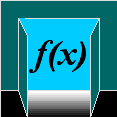
 Index
Index Course
Description
Course
Description Teaching Staff, Office Hours
Teaching Staff, Office Hours Syllabus and Schedule
Syllabus and Schedule

|
 Index Index Course
Description Course
Description Teaching Staff, Office Hours Teaching Staff, Office Hours Syllabus and Schedule Syllabus and Schedule |
|---|
The fundamental objects of study in mathematics are functions. The approach taken in MAT 123 is to present and analyze functions from several points of view: as symbolic formulae, as graphs, as numerical data, and as relationships between quantities arising in applications. Similarly, the concepts of calculus are studied from these vantage points. All of these approaches to understanding are essential.
Prerequisites: Students in MAT 123 must have received a score of 3 or better on the Mathematics Placement Examination (MPE) administered by the Department of Mathematics to all incoming freshmen. If you received a lower MPE score, take courses such as MAP 101 and MAP 103 to improve your performance on the MPE. (For more information, refer to the document ``First Year Mathematics at Stony Brook.'')
Text: The required textbook is Selected Chapters from Precalculus: Math for Calculus and Single Variable Calculus, Concepts and Contexts by James Steward. It comprises selected chapters from two books by James Stewart: Precalculus, Chapters 1-7; and Calculus: Concepts and Contexts, Single Variable, Chapters 1-3. The textbook is intended to be read. Read the assigned sections before the lecture! Reading the textbook will greatly increase your comprehension and enable you to ask intelligent questions in class. Furthermore, the lecturers and recitation instructors will not always be able to cover all of the subject material for which you will be responsible.
Examinations: The course examinations are common to all sections of MAT 123. There will be two evening examinations and a final examination, scheduled as follows.
| Midterm Exam I: | Monday, Oct 14 | 08:30 - 10:30 pm |
| Midterm Exam II: | Tuesday, Nov 12 | 08:30 - 10:30 pm |
| Final Exam: | Monday, Dec 16 | 02:00 - 04:30 pm |
Grading: Your final grade in MAT 123 will be determined by the following components.
| Recitation Grade: | 10% |
| Midterm Exam I: | 25% |
| Midterm Exam II: | 25% |
| Final Exam: | 40% |
Calculators: Calculators will not be allowed during the exams.
Math Learning Center (MLC) , located in Room A-125/7 in the Physics Building, is an important resource. It is staffed most days and some evenings by mathematics tutors (professors and advanced students); your lecturer and recitation instructor will hold at least one office hour there. For more information and a schedule, consult the MLC web site.
Students with Disabilities: If you have a physical, psychological, medical, or learning disability that may impact on your ability to carry out assigned course work, you are strongly urged to contact the staff in the Disabled Student Services (DSS) office: Room 133 in the Humanities Building; 632-6748v/TDD. The DSS office will review your concerns and determine, with you, what accommodations are necessary and appropriate. All information and documentation of disability is confidential. Arrangements should be made early in the semester (before the first exam) so that your needs can be accommodated.